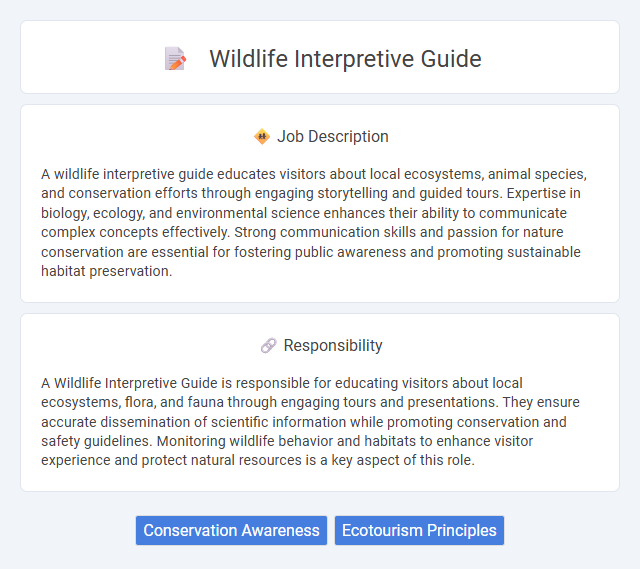
A wildlife interpretive guide educates visitors about local ecosystems, animal species, and conservation efforts through engaging storytelling and guided tours. Expertise in biology, ecology, and environmental science enhances their ability to communicate complex concepts effectively. Strong communication skills and passion for nature conservation are essential for fostering public awareness and promoting sustainable habitat preservation.
Individuals who are passionate about nature and have strong communication skills are likely to find a wildlife interpretive guide job suitable. Those comfortable with outdoor environments and prepared for varying weather conditions may have higher chances of success. People who enjoy educating others and working in dynamic, often unpredictable settings might be particularly well-suited for this role.
Qualification
A Wildlife Interpretive Guide must possess a strong background in ecology, biology, or environmental science, typically holding a bachelor's degree in these fields. In-depth knowledge of local flora and fauna, wildlife behavior, and conservation principles is essential, alongside excellent communication and public speaking skills to effectively educate diverse audiences. Certification in first aid and experience in outdoor education or guiding enhances practical qualifications for this role.
Responsibility
A Wildlife Interpretive Guide is responsible for educating visitors about local ecosystems, flora, and fauna through engaging tours and presentations. They ensure accurate dissemination of scientific information while promoting conservation and safety guidelines. Monitoring wildlife behavior and habitats to enhance visitor experience and protect natural resources is a key aspect of this role.
Benefit
Wildlife interpretive guide roles likely offer the benefit of enhanced environmental awareness through direct interaction with natural habitats. Employees probably gain valuable communication skills by explaining wildlife behaviors and ecosystems to diverse audiences. This position might also provide opportunities for personal growth and outdoor physical activity, contributing to overall well-being.
Challenge
The role of a wildlife interpretive guide likely involves navigating unpredictable natural environments, which may present challenges such as rapidly changing weather conditions or unexpected animal behavior. Effectively communicating complex ecological information to diverse audiences could require adaptability and strong interpersonal skills. Managing group safety while fostering an engaging and educational experience might demand quick decision-making and thorough knowledge of local wildlife.
Career Advancement
A Wildlife Interpretive Guide develops expertise in ecology, animal behavior, and conservation education, positioning themselves for roles such as Conservation Coordinator or Park Naturalist. Gaining certifications in environmental science and public speaking enhances prospects for leadership positions within national parks, wildlife reserves, or environmental nonprofits. Networking with conservation professionals and participating in specialized training programs accelerates career growth in the environmental education sector.
Key Terms
Conservation Awareness
Wildlife interpretive guides play a crucial role in fostering conservation awareness by educating visitors about local ecosystems and endangered species. They use engaging storytelling and scientific facts to highlight the importance of habitat preservation and sustainable practices. Their efforts promote active community involvement in protecting biodiversity and natural resources.
Ecotourism Principles
Wildlife interpretive guides play a crucial role in promoting ecotourism principles by educating visitors about local ecosystems and biodiversity. They emphasize sustainable practices that minimize environmental impact and support conservation efforts. By fostering appreciation and responsible behavior, these guides enhance visitors' connection to nature while preserving habitats for future generations.
 kuljobs.com
kuljobs.com